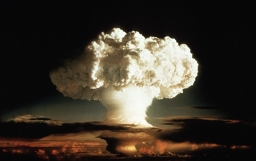David Cameron has today called for the UK to join the air strike campaign against ISIS in Syria and a vote is likely to be held in the House of Commons before they break for recess in December. War is a very real possibility.
So how, as Christians, do we respond to the question of war? Depending on your theological or political camp you might veer to a particular conclusion, potentially quite forcefully. Or maybe you feel overwhelmed by the sea of loud, uncompromising voices and want to bury your head in the sand.
While these are natural responses to such a difficult topic, there is a better way. We want to ensure that we are thinking about the idea of war from a Christian perspective, rather than being swayed by a particular political bent.
The tension for Christians is often illustrated by two New Testament texts referring to "the sword". In the Garden of Gethsemane, Jesus says to Peter: "Put your sword back in its place, for all who draw the sword will die by the sword" (Matthew 26:52). And writing to the Romans, Paul says: "Rulers do not bear the sword for no reason. They are God's servants, agents of wrath to bring punishment on the wrongdoer" (Romans 13:4).
Historically there are two conflicting camps within Christianity, both defensible with scripture: just war theory and pacifism.
The early Christians were traditionally pacifists, taking inspiration from Jesus' commitment to non-violence and the instruction to love our enemies. Pacifists see in the cross the supreme symbol of non-violence, absorbing the violence or sin of the world.
Admitting that in doing so they are moving beyond the bounds of realism, pacifists hold the mystery of the cross at the centre of their view.
As Alistair Macintosh said, "Christian pacifism is no more amenable to human reason than the cross on which it hangs."
But in their eyes, here lies the power.
Writing specifically for Christians, some of whom may find themselves in political office, theologian Stanley Hauerwas, says that his theology is not inspired by pragmatism, but by the fact that on the cross, Jesus suffered an injustice and refused to respond with violence.
He holds that his pacifism "is based upon Christological presuppositions, does not look on our disavowal of war as a strategy to make the world less violent.
"Indeed, my own view is that Christians are called to nonviolence not because our nonviolence promises to make the world free of war, but because in a war we, as faithful followers of Jesus, cannot imagine being other than nonviolent."
This position could enable a holy disengagement with the realities in which we live, however pacifists of this school seek justice through creative non-violent means and by working towards reconciliation, seeking always to overcome adversarial situations which so often lead to war.
They seek to stand as the prophetic voice for the peaceable kingdom of God.
Hauerwas explained "we're acting on reality that the Kingdom is now" in an age "inaugurated through the cross and resurrection."
But is it possible that a war could be just?
Nigel Biggar, a leading theologian and proponent of the 'just war' school, countered Hauerwas' position, claiming that the Kingdom of God is only "partially present," and just war "reflects the coming kingdom. If it's necessary to protect the innocent I don't see why Christians should keep their hands clean. I don't see a sharp dividing line between the church and the world."
St Augustine, one of the church fathers and great theologians of early Christianity, thought so, as have many Christians since.
If we accept the fact that inaction has consequences, is there a point at which inaction is less morally acceptable than action? Augustine's 'just war' tradition argues that there comes a point where love of neighbour requires action when one neighbour acts unjustly towards another neighbour.
The just war school of thought sets out certain parameters for war, but holds that there are cases in which it is permissible, and even necessary. The basic requirements are that it is in response to a great ill, and that its primary intention is to right that wrong.
There are some crucial boundaries set in place to ensure that this war remains just:
- The war must have just cause – in response to a serious wrong.
- It must be waged under legitimate authority – not just by an individual, but by those with authority.
- There must be the right intention – justice, rather than economic or military gain.
- It must be the last resort – aware that the consequences of war always involve suffering and therefore it should not be entered into lightly.
- Be proportionate to the threat – not simply using as much force as possible.
- It must be discriminate as to who is in the firing line.
- There must be a genuine hope of success.
This way of conceptualising war within Christian thinking is still widespread today, with theologians such as Nigel Biggar and Oliver O'Donovan advocating for it.
The key to a Christian view in support of war is that war must always be bound to justice.
Yes, it does allow Christians to go to war, but it is particular about the type of war and how it is waged. That we must be discriminate in our targets is key: it rules out air raids in an indiscriminate manner, terrorist action that will intentionally kill civilians, and the dehumanisation of prisoners of war through torture.
There has been a significant move within this theological camp toward including a commitment to justice beyond the point where a war is won, recognising the significant impact warfare has on civilians
When it comes to war there is no simple answer. On the one hand going to war causes terrible evils, but on the other hand not going to war permits them.
Nigel Biggar says it plainly: "Whichever horn one chooses to sit on, the sitting should not be comfortable.
"Allowing evils to happen is not necessarily innocent, any more than causing them is necessarily culpable. Omission and commission are equally obliged to give an account of themselves. Both stand in need of moral justification."
The reality is that there are consequences whichever we choose, and it is not black and white where Jesus would have stood.
What is crucial in the consideration of these two positions is a focus on what unites, rather than divides us. The goal in both parties is peace, justice and the inauguration of the Kingdom of God. Just war theory and pacifism may look fundamentally different, but whichever route your conscience leads you, our starting point must be seeking to bring God's peace and to stand prophetically in the gap between God and the world. We shouldn't be sucked into the pride of politics; we must engage with it, but not allow our worldviews to be defined by it.















